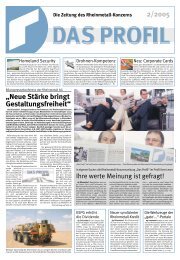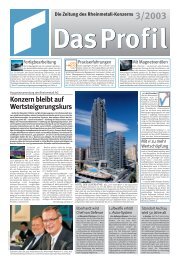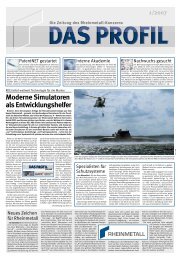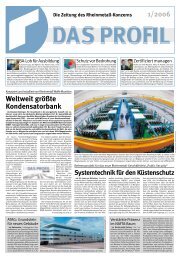PDF [1.6 MB] - Kolbenschmidt Pierburg AG
PDF [1.6 MB] - Kolbenschmidt Pierburg AG
PDF [1.6 MB] - Kolbenschmidt Pierburg AG
You also want an ePaper? Increase the reach of your titles
YUMPU automatically turns print PDFs into web optimized ePapers that Google loves.
he distinguishing feature<br />
of our defence customers<br />
is that they are always<br />
governmental institutions<br />
and organizations. For<br />
political reasons, these<br />
customers naturally primarily<br />
wish to place orders with their<br />
own national defence contractors. As<br />
soon as a contract is to be concluded<br />
with a foreign company, an offset requirement<br />
is raised. This is where the<br />
term ‘offset management’ comes into<br />
it,” explains Joost van Gemert, head of<br />
Corporate Offset Management at<br />
Rheinmetall Defence in Düsseldorf.<br />
Offset is a term used to describe a<br />
compensation business that is generally<br />
carried out on a foreign market.<br />
What may sound simple by definition<br />
is in fact highly complicated when it<br />
comes to the practical fulfilment of related<br />
obligations. Offset has many<br />
different facets.<br />
“Fundamentally, our foreign business<br />
partners want 100% offset. This<br />
can be achieved by purchasing from<br />
local suppliers in the country of the<br />
customer, by relocating production capacities<br />
or by transferring technological<br />
know-how,” explains van Gemert.<br />
Newsline<br />
By experience, the Dutch expert on<br />
offset has distinguished the following<br />
characteristics: “Different priorities<br />
are evident, depending on the country<br />
of origin of the partner. Whereas business<br />
transactions in Western Europe<br />
are considered purely from a political<br />
standpoint, the relocation of production<br />
capacities and hence the creation<br />
of local jobs are of prime importance<br />
in Eastern and Southern Europe. In<br />
the Middle East, offset is used to di-<br />
versify the local industry, for instance,<br />
by way of technology transfer.”<br />
The offset manager’s job is to secure<br />
the best possible advantage<br />
from offset transactions for his own<br />
company in negotiations that can be<br />
quite tough. Frequently negotiations<br />
will bring a commercial benefit to<br />
both parties.<br />
To give an example: in 2002 the<br />
Greek government placed a contract<br />
with the consortium consisting of<br />
Rheinmetall boosts first-quarter sales and earnings<br />
Howaldtswerke-Deutsche Werft <strong>AG</strong><br />
(HDW) and Ferrostaal <strong>AG</strong> to modernize<br />
three type 209 submarines of the<br />
Hellenic Navy. The Greeks wanted a<br />
major part of the work with components<br />
supplied by HDW to be<br />
performed by the Hellenic Shipyards<br />
in Attica. While involving and<br />
strengthening the local industry (and<br />
thus securing jobs), this also meant<br />
that HDW was spared the relatively<br />
expensive return of the submarines to<br />
Offset management with<br />
focus on compensation<br />
6<br />
Germany – in other words, both parties<br />
benefited from the deal.<br />
It is not always easy to arrive at such<br />
results in an offset agreement, but<br />
old hands like Joost van Gemert know<br />
exactly what to do. Commenting on<br />
some of the key requirements for a<br />
successful offset manager, the man<br />
from Nimwegen says: “Apart from<br />
commercial skills and knowledge in<br />
financial management, experience is<br />
vital in this business.”<br />
Off to a sound start in fiscal 2007<br />
Düsseldorf. Düsseldorf-based Rheinmetall<br />
<strong>AG</strong> got off to a good start in 2007<br />
with first-quarter sales and earnings<br />
clearly increased. The 7-percent sales<br />
advance resulted in a definite EBIT improvement.<br />
As confirmed by Rheinmetall’s<br />
CEO Klaus Eberhardt at the annual<br />
stockholders’ meeting in Berlin,<br />
both corporate sectors, Automotive<br />
and Defence, achieved an appreciable<br />
expansion in business volume. For all<br />
of 2007, Rheinmetall expects continued<br />
growth and rising earnings. Eberhardt:<br />
“As expected, this fiscal year is<br />
off to a good start and so we are optimistic<br />
regarding the months ahead and<br />
look forward to solid growth and rising<br />
earnings at Automotive and Defence.”<br />
In the first three months of 2007,<br />
Rheinmetall generated seven percent<br />
added sales, up from € 852 million in<br />
the first quarter of 2006 to € 912 million.<br />
This resurgence in business was<br />
all the more evident in terms of order<br />
intake which soared 35 percent to €<br />
1.1 billion (up from € 843 million). As<br />
a consequence, order backlog for the<br />
group at just under € 3.4 billion is 17<br />
percent higher than a year ago (€ 2.9<br />
billion).<br />
The group’s EBIT for the first quarter<br />
hiked from € 34 million to € 44 million;<br />
the EBIT margin improved accordingly<br />
from 4.0 to 4.8 percent. EBT leaped from<br />
€ 23 million to € 31 million while net income<br />
advanced by € 5 million to € 22<br />
million. Earnings per share (EpS) after<br />
minority interests of € 1 million climbed<br />
from € 0.45 to € 0.60.<br />
The Automotive sector continued on<br />
the path of growth in the first three<br />
months of this year. Despite ongoing<br />
price pressure and unfavorable exchange<br />
rates, sales mounted three percent<br />
to € 583 million, again outpacing<br />
stagnant world auto production (down<br />
0.2 percent in the quarter).<br />
Automotive’s EBIT for the first quarter<br />
rose six percent to € 34 million. The<br />
chief reasons for this growth were the<br />
profit contributions from added sales.<br />
The EBIT margin inched up from 5.7 to<br />
5.8 percent.<br />
At € 328 million, the Defence sector<br />
reported its highest-ever sales in the<br />
first quarter, the year-earlier volume being<br />
exceeded by 15 percent. Above all,<br />
sharp gains were recorded by the Land<br />
Systems and Weapon Munition divisions.<br />
Order intake in the first three<br />
months of 2007 reached € 550 million,<br />
almost double that of the previous<br />
year’s € 282 million. The largest contributor<br />
was the Air Defence division<br />
which booked orders for just under €<br />
300 million in the first quarter of 2007.<br />
With sales up to this extent, Rheinmetall<br />
Defence’s EBIT in what is a normally<br />
weak quarter, showed a significant<br />
gain of € 3 million to € 11 million.<br />
The EBIT margin rose commensurately<br />
from 1.0 to 3.4 percent.<br />
Assuming a stable global automotive<br />
climate and a constant development in<br />
defence expenditures, the Rheinmetall<br />
group is sticking to its target of an average<br />
annual growth rate of at least five<br />
percent. Based on sustained solid operating<br />
performance by its two sectors,<br />
Automotive and Defence, Rheinmetall<br />
expects to close fiscal 2007 with<br />
broadly improved earnings.


![PDF [1.6 MB] - Kolbenschmidt Pierburg AG](https://img.yumpu.com/8657804/6/500x640/pdf-16-mb-kolbenschmidt-pierburg-ag.jpg)
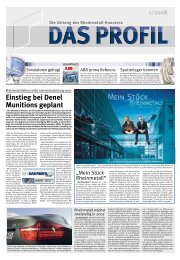


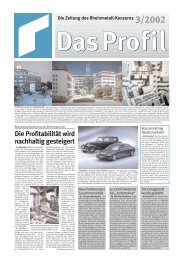
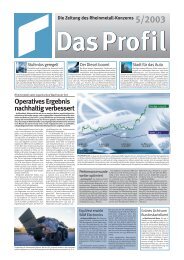
![PDF [2.4 MB] - Kolbenschmidt Pierburg AG](https://img.yumpu.com/8295864/1/184x260/pdf-24-mb-kolbenschmidt-pierburg-ag.jpg?quality=85)
![PDF [2.5 MB] - Kolbenschmidt Pierburg AG](https://img.yumpu.com/8112793/1/184x260/pdf-25-mb-kolbenschmidt-pierburg-ag.jpg?quality=85)


